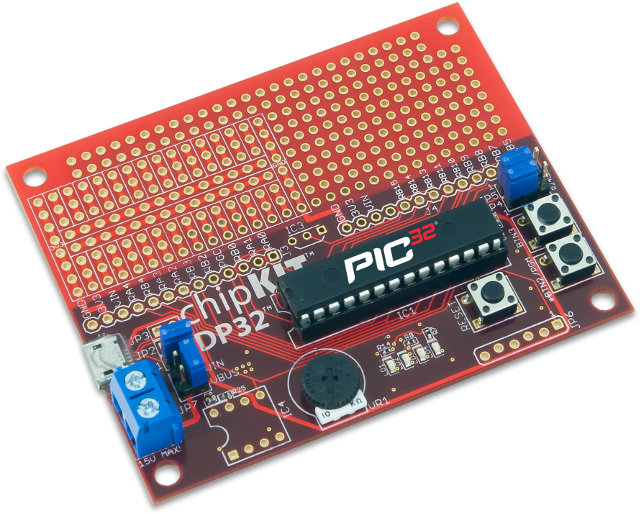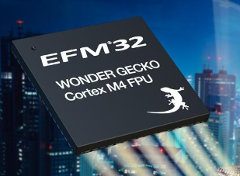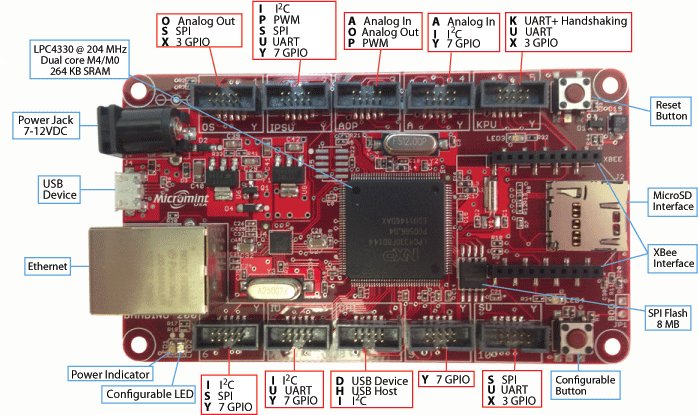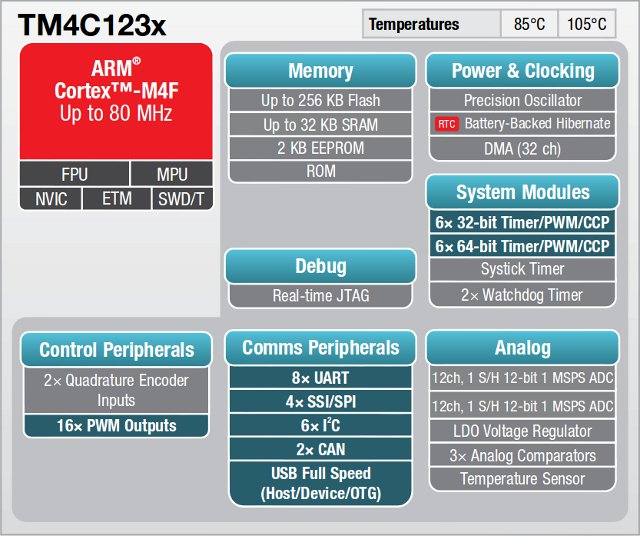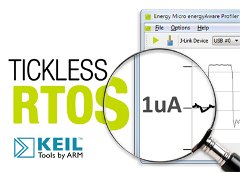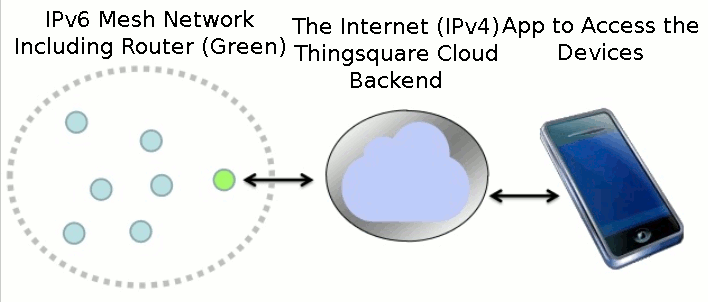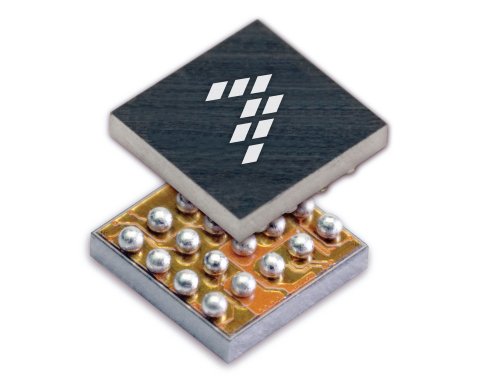Microchip Technology has announced several new tools, expanding its Arduino compatible chipKIT platform ecosystem, based on Microchip’s 32-bit PIC32 microcontrollers (MCUs) available in low pin count SOIC or SPDIP packages. Digilent’s chipKIT DP32 board features basic I/O and interface components, including a prototyping aera, user buttons, and a potentiometer. The board (part # TDGL019) costs $23.9, and should be available on May 17 at microchipDIRECT. The chipKIT Fubarino Mini board, from a partnership between FUBAR Labs and Schmalz Haus, provides another option for Arduino-compatible development with 32-bit PIC32 MCUs, using a smaller form factor. The board is supposed to be available today for $19.95 on microchipDIRECT, but I could not find it yet. If you don’t want/need a development board, the company also provides PIC32MX250F128B MCU in PDIP package (28-pin) preprogrammed with chipKIT USB Bootloader. This MCU, clocked up to 40Mhz, includes 128 KB Flash and 32 KB RAM, as well […]
Energy Micro Launches EFM32 Wonder Gecko Cortex M4 MCUs and Starter Kit
After having announced EFM32 Wonder Gecko MCU family in February, Energy Micro has just officially launched their new family of high performance, low power MCUs. These micro-controllers come with an ARM Cortex-M4 CPU with floating-point unit (FPU) and DSP instruction set that helps reduce the processing time of your application in active mode. All MCUs come with 32KB SRAM, and between 64 to 256KB flash. Energy Micro expects their new chips to be used in applications such as gas metering, energy metering, water metering, smart metering, alarm and security systems, health and fitness applications, and industrial and home automation. One key advantage of this new MCU family is the implementation of TSMC’s eLL (Extreme Low Leakage) technology that dramatically reduces power consumption at high temperatures. There top of range MCUs (EFM32WG995FXXX) feature the following specifications: ARM Cortex-M4 CPU platform @ up to 48 MHz with DSP instruction support and floating-point […]
Micromint Bambino 200 and 200E Dual ARM Cortex M SBC Support .NET Gadgeteer and mbed Applications
Micromint, a US based supplier of single-board computers and industrial embedded controllers, has just announced Micromint Bambino 200 and 200E single board computers powered by NXP LPC4330 dual core Cortex M4/M0 MCU @ 204Mhz. Those 2 boards support .NET Gadgeteer and mbed frameworks. Key Features of Micromint Bambino 200: NXP LPC4330 Dual core ARM Cortex-M4/M0 @ 204 MHz with 264 KB SRAM. Storage – 4MB SPI flash USB – High-speed USB 2.0 device port used both as a power source and for data communications or debugging Misc – 2 buttons, 2 LEDs 5 Gadgeteer sockets Dimensions- 101.6 x 58.4 mm Bambino 200E is based on the same platform but adds: Storage – 8 MB SPI Flash (vs 4MB) 10 Gadgeteer sockets 10/100 Mbps Ethernet microSD socket Xbee socket Power jack – 7 – 15 VDC The company also explains that a JTAG for low level debugging, a coin cell battery […]
Texas Instruments Announces Tiva Cortex M4 MCUs and $12.99 LaunchPad Evaluation Kit
Texas Instruments has just announced the Tiva ARM MCU platform, and specifically the Tiva C Series TM4C123x ARM Cortex-M4 MCUs, which are the first Cortex-M MCUs to be built on 65 nanometer flash process technology. The Tiva C Series TM4C123x MCUs, formerly known as Stellaris LM4F MCUs, are available now and target home, building and industrial automation. Key features and benefits of Tiva C Series MCUs: MCU Core – ARM Cortex-M4 floating-point core, operating at up to 80 MHz. Mixed-signal applications with high-performance analog integration – 2×12-bit ADC and 3 comparators.12-bit ADC accuracy is achievable at the full 1 MSPS rating without any hardware averaging. On-chip connectivity options – USB (host, device and On-The-Go), UARTs, I2C, SSI/SPI, CAN, etc.. Non-volatile storage of user interface or configuration parameters to reduce system cost – Thanks to integrated EEPROM. Low power – Standby currents as low as 1.6 uA. Large choice of MCU […]
Keil RTX RTOS is Now Available for Energy Micro EFM32 MCUs
Energy Micro has recently announced the availability of the Keil RTX real-time operating system (RTOS) as part of its Simplicity Studio tool suite. The Keil RTX has been optimized for ARM Cortex-M processors to provide flexible scheduling and high-speed operation, and has been improved to enable an ultra-low power, deep-sleep mode between tasks. Energy Micro has implemented a tickless mode in Keil RTX. This mode allows the EFM32 Cortex M3 MCUs to wake up only when needed, either at a scheduled time or on an interrupt event. This results in much lower power consumption in sleep mode compared to other SysTick implementations. The video below shows the difference between SYSTICK mode where the system consumes about 2.7mA in active mode, and 830 uA in sleep mode to the new tickless mode where the MCU still consume the same amount of energy in Active mode, but only 1uA in sleep mode, […]
$19 RFDuino is a Coin-sized Bluetooth Arduino-compatible Board
RFDuino is a tiny board, about the size of a coin, powered by Nordic nRF51822 Cortex M0 SoC including bluetooth 4.0 LE support, and software compatible with Arduino UNO and DUE board, so you can just use Arduino sketches with the board. Bluetooth allows it to communicate with your smartphone (iPhone for now, but Android support is coming) to control motors & relays, monitor sensors, turn LEDs on/off, and more. Key features of RFDuino board: MCU – Nordic nRF51822 Cortex M0 @ 16 MHz Memory – 16 KB on-chip SRAM Storage – 256 KB on-chip Flash Connectivity – Bluetooth 4.0 Low Energy built in MCU GPIO – 7 pin software configurable as digital IO, analog ADC, SPI, I2C, UART and PWM. The company currently offers several stackable shields for RFDuino including battery shields (1x AAA, 2x AAA, and CR2032 coin battery), a servo shield, a USB shield, a prototype shield […]
Thingsquare Mist – Open Source Firmware for The Internet of Things
Thingsquare recently released the source code for the Thingsquare Mist firmware, an ultra lightweight router software (<4 kB memory) for the Internet of Things based on open Internet standards such as IPv6, RPL (Routing Protocol for Lossy networks), and 6lowpan. Thingsquare Mist allows to connect battery-powered wireless micro-controllers to the Internet, and is currently used in applications such as smart light bulbs, connected home appliances, and connected cities. The IPv6 mesh network is composted of nodes with a low power radio that communicate with the Mist router (Green), which in turn connect to the Internet and Thingsquare Cloud backend (Thingsquare Haven) to store the data, and/or receive control commands via Ethernet or Wi-Fi. The end users can then use an App to monitor, and/or control the devices remotely. Thingsquare Mist uses IETF RPL IPv6 mesh routing protocol (pronounced “ripple”) for IPv6 nodes communications. Thingsquare Mist runs on several low-power wireless […]
Freescale Unveils Kinetis KL02, an Ultra Small (1.9×2.0mm) ARM Cortex M0+ Microcontroller
Freescale Semiconductor introduced the Kinetis KL02, the world’s smallest ARM MCU, at Embedded World 2013. KL02 is an ARM Cortex M0+ micro-controller designed to address the miniaturization needs of the Internet of things, and its size (1.9×2.0mm) makes it suitable for applications such as ingestible healthcare sensing, portable consumer devices, remote sensing nodes, and wearable devices. Kinetis KL02 MCU features include: 48 MHz ARM Cortex-M0+ core, 1.71-3.6V operation Bit manipulation engine for faster, more code-efficient handling of peripheral registers 32 KB flash memory, 4 KB RAM High-speed 12-bit analog-to-digital converter High-speed analog comparator Low-power UART, SPI, 2x IICI2C Powerful timers for a broad range of applications including motor control Power Efficiency – 15.9 CM/mA (Coremark 1.0) -40 °C to +85 °C operation The MCU is manufactured using chip-scale package (CSP) technology that allows to connect the die directly to the solder ball interconnects and, in turn, to the printed […]


